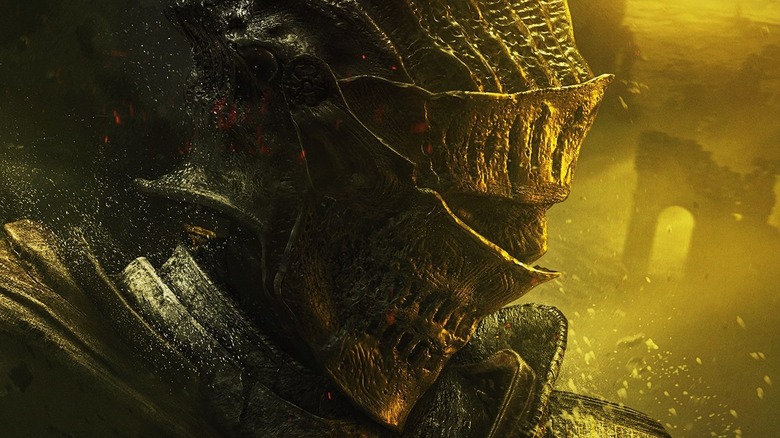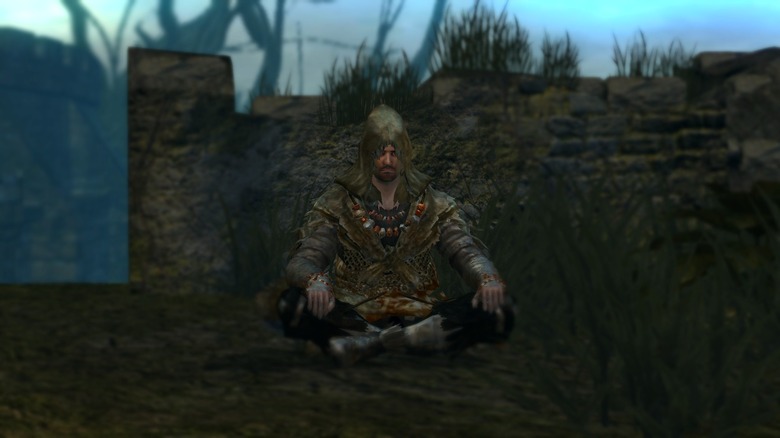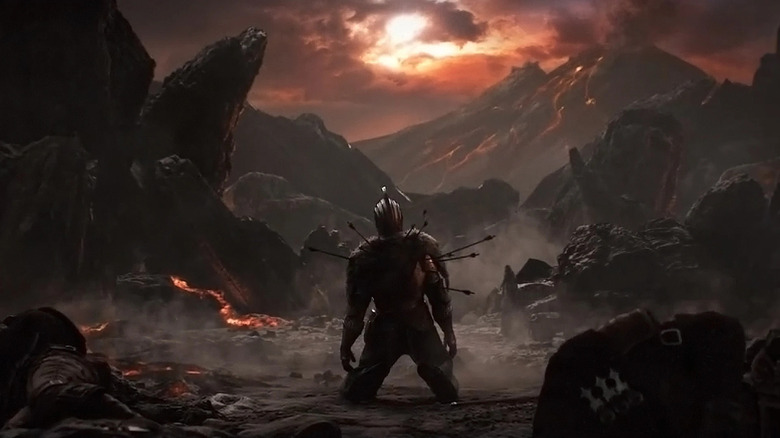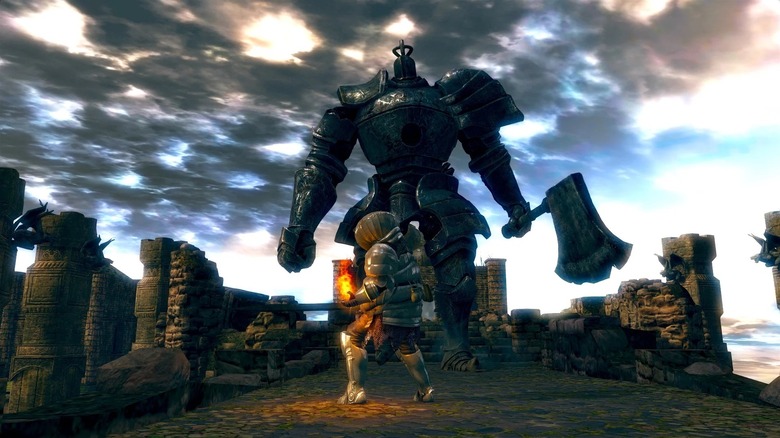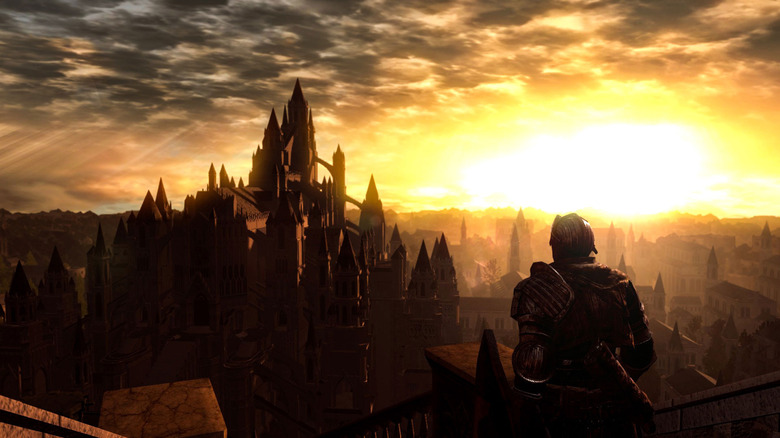Dark Souls And Depression: How The Series Helps Players With Their Mental Health
FromSoftware's "Souls" series has earned a reputation for its unforgiving combat, pitting players against hostile beings within a dark and decaying world. Those familiar with the franchise expect to die often, spurred by the hope that they'll push a little further in the next run before a canny foe forces them back to the bonfire. Thanks to this distinct, brutal loop, the IP has even spawned its own sub-genres: Soulsborne and Soulslike.
Given the endless cycle of failure in "Dark Souls," it may come as a surprise that several players who have experienced depression stated that the series helped their mental health. The symptoms of depression vary from person to person, but often include all-encompassing sadness or emptiness, sharp drops in self-worth, hopelessness, energy loss, and indifference to once enjoyable or significant activities. These symptoms can interfere with day-to-day functioning, placing acts like getting out of bed or eating a meal beyond the realm of possibility. At its worst, depression may lead to a fixation on death or even suicide (via National Institute of Mental Health).
Due to the nature of depression and its related mental disorders, it may seem like the gloomy setting and punishing mechanics of "Dark Souls” would cause someone to feel worse. To understand the potential benefits, you have to delve deeper into FromSoftware's creation.
'Don't you dare go Hollow'
It's easy to draw parallels between depression and a process in "Dark Souls" known as "Hollowing." In all three entries, the player adopts the role of an Undead, one of a group of afflicted humans trapped in an endless cycle of death and resurrection. Each time they fall and return, the Undead drift closer to losing their control and identity. Those who cross this threshold are referred to as Hollow.
Players encounter several Undead NPCs throughout their journey, some of whom turn Hollow as the games progress. Though most fear such a fate, those who lack purpose, connection, or values seem to reach this breaking point more quickly. "The individuals that inhabit the world mostly have their own meaning for existing ... and without that meaning, they will turn Hollow. This is like life," observed one individual on Reddit. "Without [meaning] ... we will find ourselves Hollowing in loneliness ... without the will to try to keep going."
In some ways, dying and returning to the bonfire mimics the experience of entering a depressive episode. Failure, helplessness, frustration, a sense of lost progress – all feelings that can arise from both situations. Then the sadness, doubt, or even self-loathing rushes in, and you wonder if there's even a point to trying again. "Dark Souls" answers with a quiet but firm "yes."
It's okay to fail
Society tends to treat failure as a negative, a mark against a person that indicates their worth (or lack thereof). Due to this perception, some individuals go through life avoiding failure at all costs. Their worlds shrink and opportunities dwindle as they shy away from any action that might not end in success (per Texas A&M University). Those with mental health issues may find this a familiar sensation, as some constantly live in fear of relapse and triggers. Depression or another disorder becomes part of their identity, and they fall into the trap of equating an episode with defeat.
Though "Dark Souls" has built its gameplay around failure, the series approaches the subject from a much different direction. "'Dark Souls' succeeds precisely because it's a game that encourages failure," asserted one fan. "[It's] one of the few games that tells you: No, you didn't do it right, but that's okay. Try as many times as you want, but you need to do it right." Without the stigma of failure, players are free to adapt and test new methods, rather than remain trapped in the same mindset.
"Failure is just a learning process," another player said while describing their key takeaways from the franchise. "It does not mean that you are a failure, just that you need to keep trying until you find a way to move [forward]."
The power of perseverance
Many players have reported coming away from their "Dark Souls" playthroughs with better tools to overcome obstacles in their real lives. "The atmosphere of it is bleak and getting wrecked by a boss or an area over and over again can be really demoralizing but you keep going and you keep getting wrecked... until you figure out how not to get wrecked," mused one person on Reddit. For them, these victories served as uplifting milestones.
From the dying setting and vicious enemies to the constant threat of going Hollow, the odds feel stacked against the protagonist from the beginning. Faced with these seemingly insurmountable obstacles, players may feel they can't get past a certain boss or section of the games. "More often than not, you [realize] that this feeling was a real miscalculation," pointed out a fan. "Even though sometimes things [seem] completely overwhelming at first, your subconscious might be completely wrong about it ... which is an important thing to understand to overcome depression."
In "Dark Souls," a shift in perspective or methods can mark the difference between victory and defeat. To do that, you'll likely have to take a step back and view the scenario as it really is, as opposed to how you interpret it. These hard won triumphs can snowball, propelling you forward with new approaches for success that go beyond the series.
Dark Souls is not a substitute for mental health treatment
While a large number of people have shared positive "Dark Souls" experiences, it's important to note a few caveats. First, players should not use video games as a substitute for mental health care. Though promising research (such as Ninja Theory's Insight Project) indicates the medium could one day play a greater role in alleviating mental distress, treating depression and related issues requires the assistance of trained professionals.
Second, there's a difference between feeling sad and clinical depression. To be diagnosed with the disorder, a person's symptoms must persist for a minimum of two weeks (per NIMH). There are also several types of depressive disorders that manifest in unique ways, such as postpartum depression and seasonal affective disorder. There's no one-size-fits-all variety, and some "Dark Souls" players have even reported that the game made their depression worse.
Finally, clinical depression doesn't stem from a lack of willpower: It's tied to a number of elements, including genetics, biology, and neurochemistry. Despite widespread misconceptions, those who experience it can't simply "power through" or try harder to get better. Instead, they must rely on strategies such as lifestyle changes, medication, and psychotherapy to see improvement – a process that often takes years and may be hindered by lack of access to affordable healthcare.
This isn't to say that video games can't change lives. The medium is uniquely suited to spreading mental health awareness, allowing users to immerse themselves in different perspectives. It also helps forge connections between individuals who previously suffered in silence. At its best, "Dark Souls" is a shining example of the power of games to help players feel less alone, but it cannot replace a treatment plan and real-life support network.
If you or someone you know needs help with mental health, please contact the Crisis Text Line by texting HOME to 741741, call the National Alliance on Mental Illness helpline at 1-800-950-NAMI (6264), or visit the National Institute of Mental Health website.

